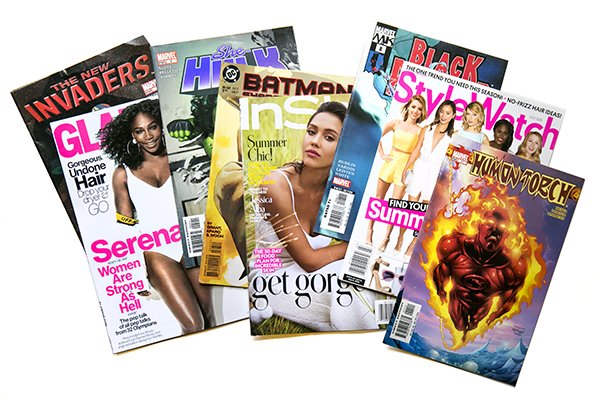Batman and Taylor Swift are here to protect you
Most people have a favorite celebrity or fictional character, and that's OK.
Eureka moments in science, at least the legendary ones, happen in unexpected places: the bathtub, a train station, a patch of ground beneath ripening apples.
So why not the supermarket checkout line?
“I was flipping through a magazine. I think it was People, US Weekly or something,” said Ariana Young, an assistant professor of psychology and one of the first faculty members hired for the Bachelor’s Degree for Professionals program.
“I was looking at a picture of Jennifer Aniston – she’s one of my favorites, especially at the time – and I was looking at a picture of her in a bikini, thinking, ‘You know, the research tells me I should feel bad about myself after seeing this’ – because that’s what all the research shows, that exposure to thin media ideals makes us feel bad. But Ididn’t feel bad,” she said. “I was like, ‘She’s got an awesome body, good for her! I feel great right now seeing this.’ It made me realize there might be more to it.”
When it comes to how you see your body, dwelling on images from the media is not always harmful, Young realized. With help from collaborators, she was soon designing controlled experiments showing that feelings of closeness to a fictional character or a celebrity can moderate and even reverse the process in which physical comparisons lead to low self-esteem.
A few of the findings:
- When women are exposed to a favorite celebrity who is slender, they feel better about their bodies than they do when exposed to thin celebrities they do not care for.
- The more that a woman perceives herself and a favorite celebrity to be alike in overall personality, the more power the celebrity has to make her feel better about her body.
- On days when people – men or women – feel bad about their bodies, they are more likely, the next day, to seek out a favorite celebrity.
- When shown an image of a muscular superhero for whom they have no special affection, men feel worse about their bodies.
- But when they identify with or sense a bond with the superhero, they experience no negative feelings about their bodies after viewing the images.
- Not only that, but the same men display greater physical strength shortly after viewing the images, as measured by the force of their grip on a handheld dynamometer.
The experiments brought together two existing lines of research in social psychology. One line of research shows that, yes, images on TV, in magazines and elsewhere have powerful effects on how people see their own bodies. At the same time, another group of studies shows that people can develop strong psychological bonds with celebrities as well as with fictional characters, including superheroes. These one-sided relationships, known as “parasocial relationships,” have some of the positive features of friendships.
“We take on the traits of our favorite celebrities as if they’re our own. So we all have that friend who’s super-smart, and whenever we’re around them we feel smart by association. We sort of bask in their glory of smartness. And the same thing happens with media figures,” Young said.
Men and women develop affections in distinct parasocial circles, Young noticed as she began to poll undergraduates in studies. When asked to name a favorite celebrity, men often think of actors who’ve played superheroes in movies: Christian Bale (Batman), Robert Downey Jr. (Iron Man) and so on.
Members of both sexes feel connections with fictional characters, and Young is careful now to phrase the question to include characters from books and films. Nearly everyone, she observes, has a parasocial favorite or favorites.
“For women, it tends to be a nice balance of celebrities and fictional characters. For men, it tends to be more fictional characters, or even athletes.”
For future studies on parasocial bonds, Young has plenty of unanswered questions. Do people feel more inclined to help others, to save the day, when exposed to favorite superheroes? How do we react when disaster strikes a parasocial friend, or when we see such a person in decline? What about the relationships people have with super-villains and the celebrities they love to hate? Can those have any positive effects?
What’s already clear is that more than one strategy is needed to protect people, especially young women and men, from the harmful effects of visual culture. All of the unrealistic, photoshopped images in our world aren’t going away. Instead of trying only to reject them, should we sometimes encourage closeness to the characters in them?
